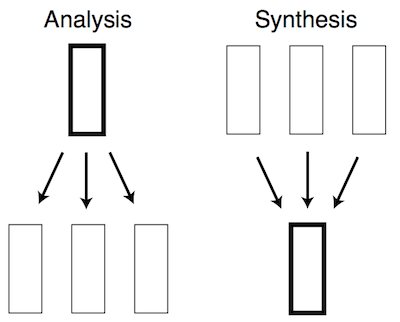For a lot of people, the words “synthesis” and “analysis” might be synonyms in a work context. In fact, they technically mean different things. Synthesis is the process of building information up, and analysis is the process of breaking information down. You can make an argument that we’ve reached a place with “Big Data” and analytics where the goal is synthesis. Basically, you want to take a whole bunch of data points and figure out which ones, when tied together, give you a complete view of the behavior you’re trying to analyze. In short, “synthesis is in.”
There are still a couple of flaws around Big Data as a concept — for example, it isn’t necessarily tied to revenue yet at a lot of companies and the C-Suite isn’t completely sure what to make of it — and we’re definitely not teaching it enough. (Higher education does tend to move slower than business innovation; a lot of business schools, for example, are still teaching the conventional sales and marketing funnel. That doesn’t really exist anymore.)
You can say a lot of negative things about Malcolm Gladwell and his approach, but he is a pre-eminent author and “thought leader” for a lot of middle class yuppies, to be sure. Here he is discussing this essential concept — that it takes more than just technology tools to access true meaning. You need the right attitude, creativity, and context.
A couple of key things would need to happen in most businesses for this idea around synthesis to take flight:
1. Re-contextualize ‘synthesis’ as a meaningful word: In most companies, I’d argue that ‘synthesis’ is one of the ultimate hated buzzwords.
2. Train, train, train: It’s hard to teach a person to be creative, but it’s easier to teach a person to look at data and insights through different lenses. But if you’re not actually training the person on what to look for and how to look for, they won’t know. So honestly, focus on training.
3. Move out of your comfort zone: A lot of people I’ve worked with — at different jobs — tend to look at data and analysis as “Oh, that’s the domain of X-Person or Y-Team.” No. It should be the domain of everyone. Do you know how many work arguments come from the fact that two people have two different ideas on a strategy? It’s probably over 50 percent. Test the ideas and look at the data you get back. One argument is probably going to win out conclusively. “Big Data” is a concept like leadership: it can only really work if everyone has a chance at it or some relationship with it. If only one team controls it, the buy-in won’t be there.
The notion of Big Data can be exceptionally powerful at removing the focus on “gut” decisions that might not be best for a company, but seem best to a specific leader. You can’t necessarily change the inputs — how it’s being taught in school, for example — but you can change the outputs, or how your specific organization processes and works with information. And heck, while you’re at it, use it to make yourself more productive.

These are nice ideas, but it’s sad that concepts like these have to be reiterated. So much of “thought leadership” that I see is just regurgitated common sense that’s repackaged as “getting back to basics.”
And Big Data…why do people make this concept so complicated? It’s still comprised of databases with rows and columns – just on a much larger scale. Even “unstructured” data sets wind up in rows and columns, to be queried by some tool like MS SQL (or some derivative), DB2, etc.